KABUL (SW) – An exclusive survey conducted by Salam Watandar indicates that a wide range of married women and unmarried girls are faced with the dilemma of forced marriage across the country.
Definition
Marriage in Islam is the main foundation of family and social life. From a technical point of view, this solution is revealed in the agreement that the marriage between the bride and the bridegroom takes place with their consent.
Religious and socially defined and undefined values are the basis of the “bond” agreement between the “man and the woman”, which is the foundation of a family.
In addition, marriage between two human beings is celebrated in the light of Islamic and legal principles with special ceremonies to enter a new phase of life.
Elaboration of the matter
Afghanistan with the traditional values and due to years of war and insecurity, is a country where girls and women are generally not allowed to make decisions related to their lives. In addition to important decisions, many girls are married off without even asking their views. Relatedly, most social transactions also take place without considering religious, legal, and civil principles, based on prevailing traditions. These traditions even influence the nature of marriages.
Marriages in Afghanistan, due to prevailing traditions, have often been coercive for many women and girls alongside boys. The consequences of this have impacted the success rate of marriages and the satisfaction of spouses after marriage. For this reason, in this study, the satisfaction levels of women before and after their marriages, the nature of their marriages, and the age of marriage of these women have been investigated.
Although there have been numerous studies and research conducted on the customs and prevalent practices of marriage in Afghanistan, what should be written and noted about the lives of girls and women before and after marriage, which is also significant, has been greatly overlooked.
This study also examines aspects of girls’ and women’s marriages that affect both their marital life and their life before marriage. In this research, the impacts of forced marriages and the positive effects of desired marriages on girls’ preferences and other aspects of married life that have not been previously addressed are also investigated.
However, the extent to which marriages in Afghanistan adhere to traditions and occur coercively, and to what extent women are satisfied with their mutual married life, is a question that this research seeks to answer.
In this survey, a number of girls and women who are married were interviewed for the purpose of research.
In the survey, female respondents were asked how much were they happy with their marriage? Were they consulted?
Survey questions
The following questions were asked for the survey:
- How satisfied are women with their marriages?
- What was the nature of the surveyed women’s marriage?
- Will the family decide or your consent will be considered?
- How old were the surveyed women when they got married?
- which reasons have been considered to be the cause of women’s dissatisfaction with their marriage?
- What points should families consider before their children get married?
- What are some recommendations to curb forced marriages?
Survey background
Although multiple reports from media outlets have been published regarding the customs, types, and status of marriages in Afghanistan, and various aspects of Afghan marriages have been examined, however, no statistical research has been conducted in the past three years on the status and level of women’s satisfaction with their marriages. Therefore, to fill this information gap, this research has been undertaken, the results of which can have a significant impact on the quality of future marriages in the country.
In this survey, various aspects of mutual married life and women’s satisfaction with their marriages are examined. Factors and consequences of forced marriages are also investigated, the results of which will have an impact on the general trend of marriages in Afghanistan.
Objectives of the survey
- Addressing ambiguities regarding the types and status of marriages in Afghanistan.
- Investigating the level of women’s satisfaction with their marriages.
- Analyzing shortcomings of the weddings
- Identifying factors contributing to unsuccessful marriages.
- Identifying appropriate methods and approaches for successful marriages.
State and end date
This survey started on February 22, 2024 and ended on April 20, 2024.
Analysis
For this survey, the “SPSS” software program was used to analyze the numbers, data and information.
Challenges of the survey
Studying this topic in a traditional society like Afghanistan is not without its challenges and difficulties. This research encountered various problems and challenges, some of which are mentioned in the conclusion.
Most of the women in Afghanistan do not want to talk about their personal life because of the traditional family structure.
In Afghanistan, there are many restrictions on girls and women’s education, higher education and work, so, there are many problems that girls and women face in the survey. Some of them did not want to take part in the survey because of these limitations imposed by their families or in society.
This survey was conducted in 23 provinces of the country. The most difficult part was encouraging women in these parts to participate in the survey despite the restrictions and fears.
Variables
Women, illiteracy, ruling traditions in the society, forced marriage, and low age marriages, patriarchy are the variables of this study.
Summary report
In this survey, 389 women were interviewed. As per provinces, Kabul with 13% was on top of the list followed by Maidan Wardak with 12%, Ghazni with 8% while Ghor, Badakhshan, Zabul, and Paktia were at the bottom with 0.5 percent of participants in the survey.
Out of 389 women and girls who were interviewed in the survey, 290 were married, of which, 45.5% were forced to marry and another 41.7% said they got married by mutual consent with their family and 12.8% said they married by their own will.
Out of the total of 290 married women surveyed, 63% are dissatisfied with their marriage, while 37% are satisfied. Among the dissatisfied women, 58 regret their marriage entirely, and 125 are somewhat dissatisfied. Still, among the satisfied women, 28 are very satisfied, and 79 are moderately satisfied with their marriage.
Survey report
Salam Watandar conducted interviews with 389 women and girls in 23 provinces of Afghanistan. Kabul with 13% had the bulk respondents in the survey, however, Ghor, Badakhshan, Zabul and Paktia with 0.5 percent of the participants had the less respondents.
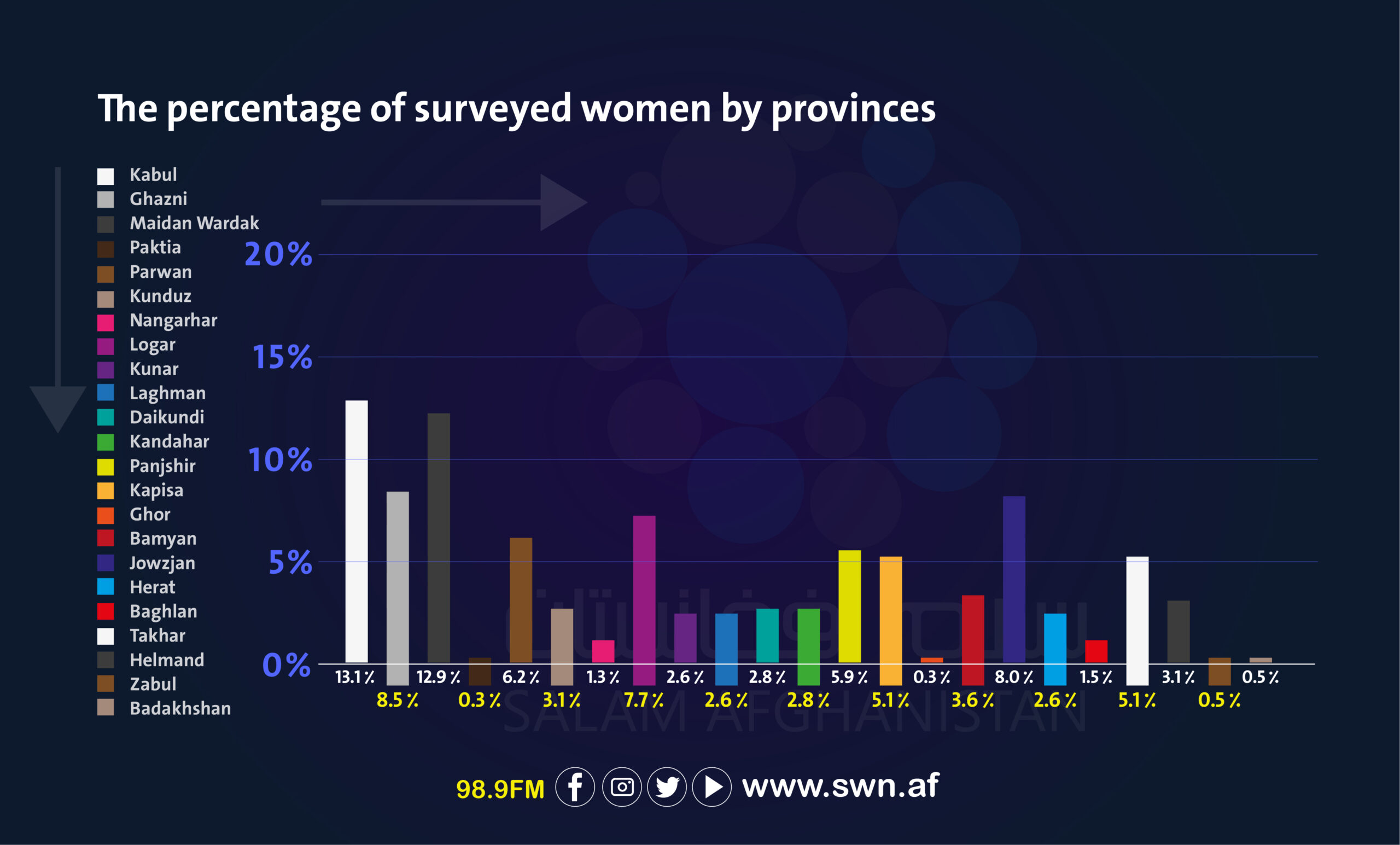
In the survey, 33.7 percent participants were between 18 and 24 years old. 32.4 participants were aged between 25 and 30 years old, 20.8 percent aged between 30-35 years.
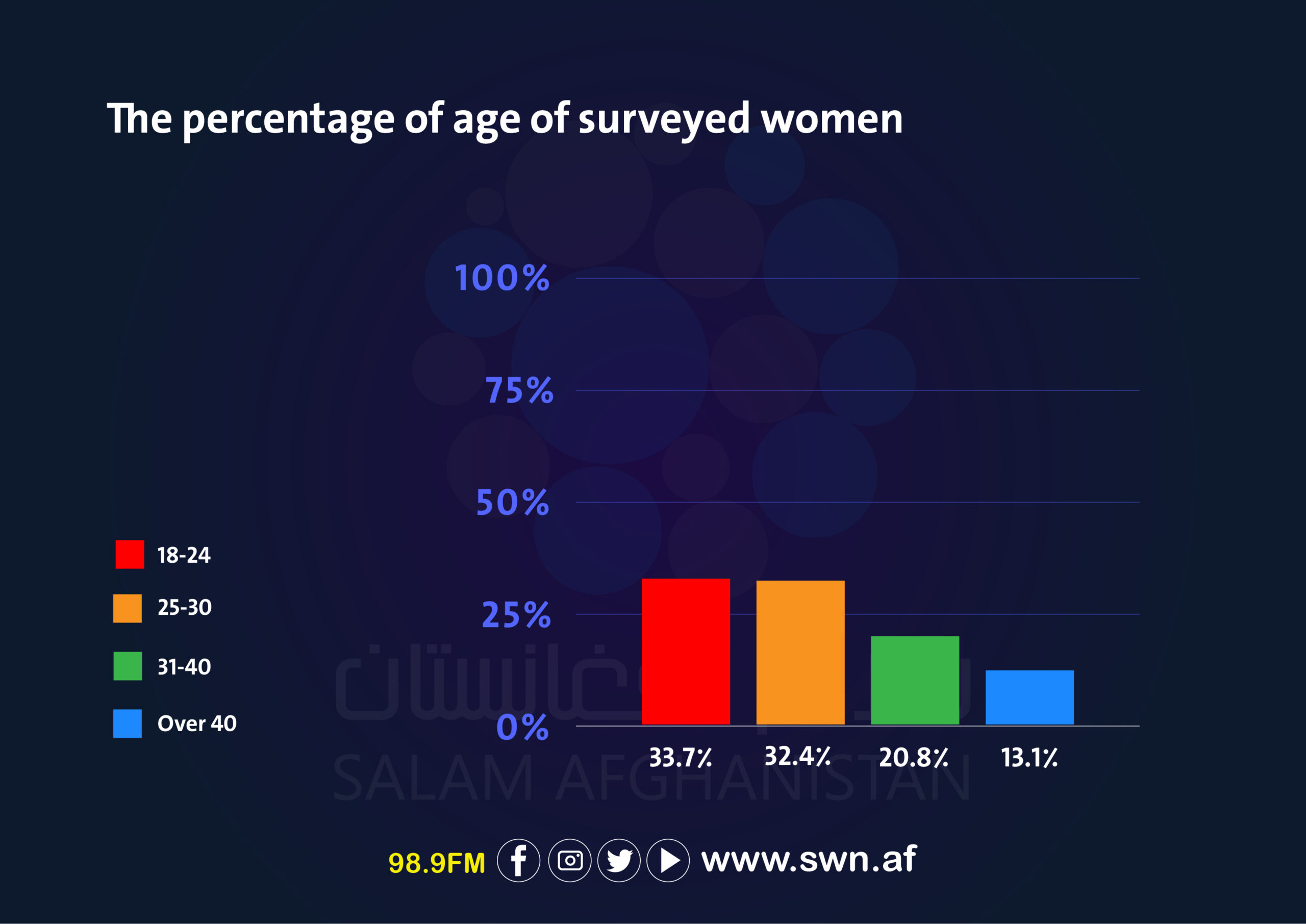
Up to 13.1 percent were 40 years old and 66.1 percent of the participants were married, 25.4 percent are single and 8.5 percent are engaged.
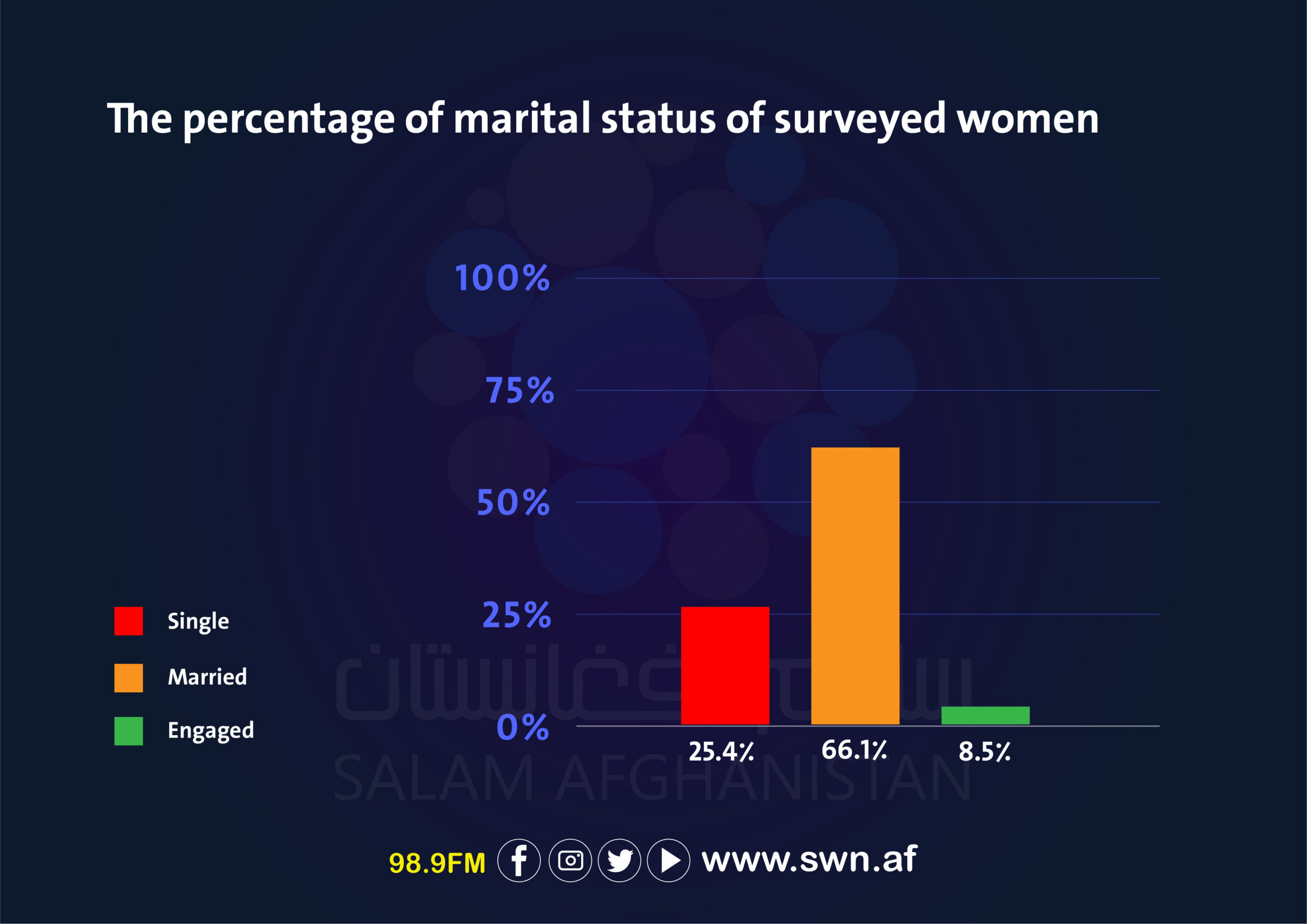
32.1 percent of the surveyed participants have graduated from high school, 31.9 percent have a bachelor’s degree, 21.6 percent are illiterate, 12.6 percent have completed primary education, and 1.8 percent have masters’ degree.
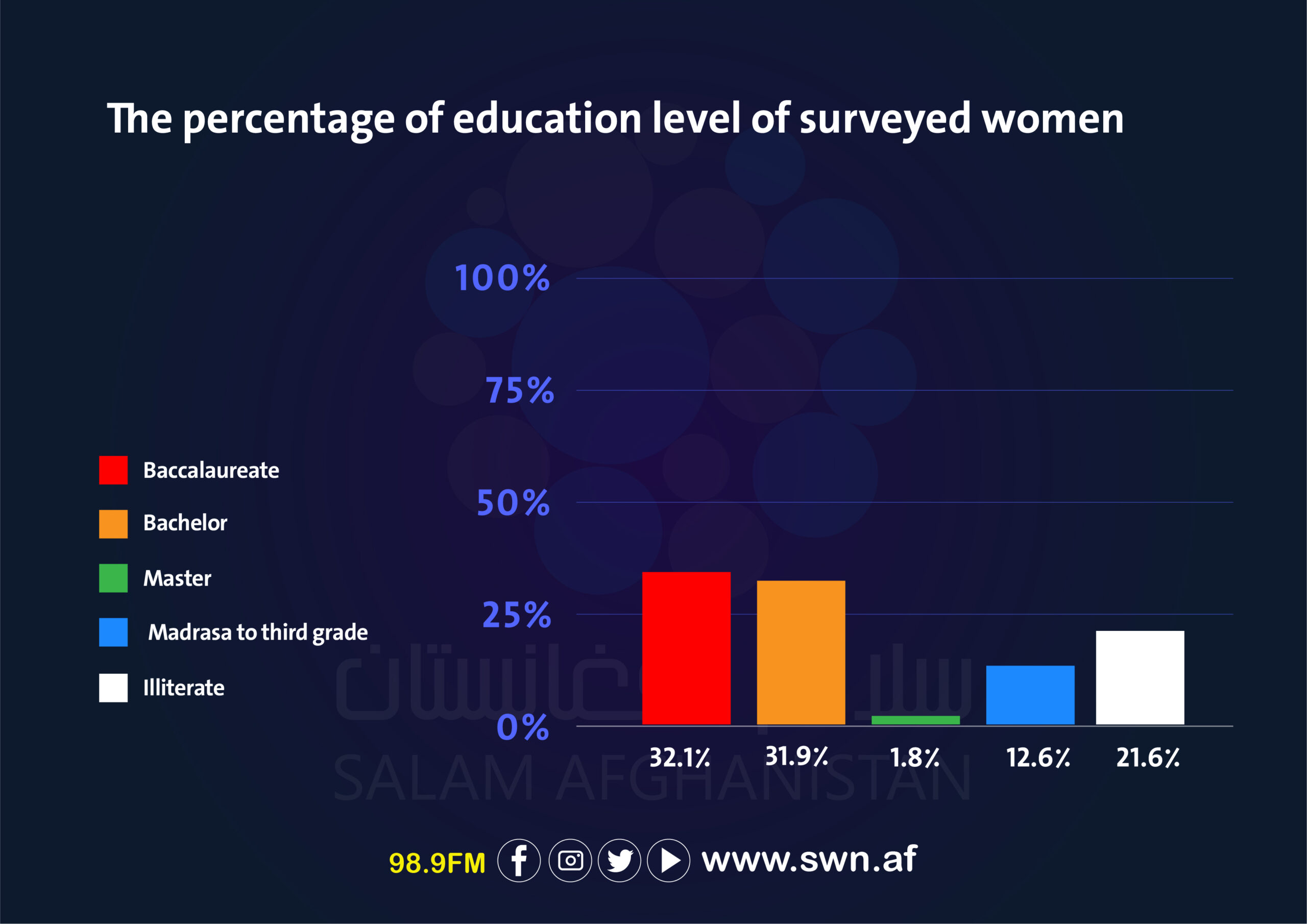
Based on the data collected in this survey, out of the total number of married women, 45.5% were married coercively, 41.7% were married based on family advice, and 12.8% of women chose to marry according to their own will.
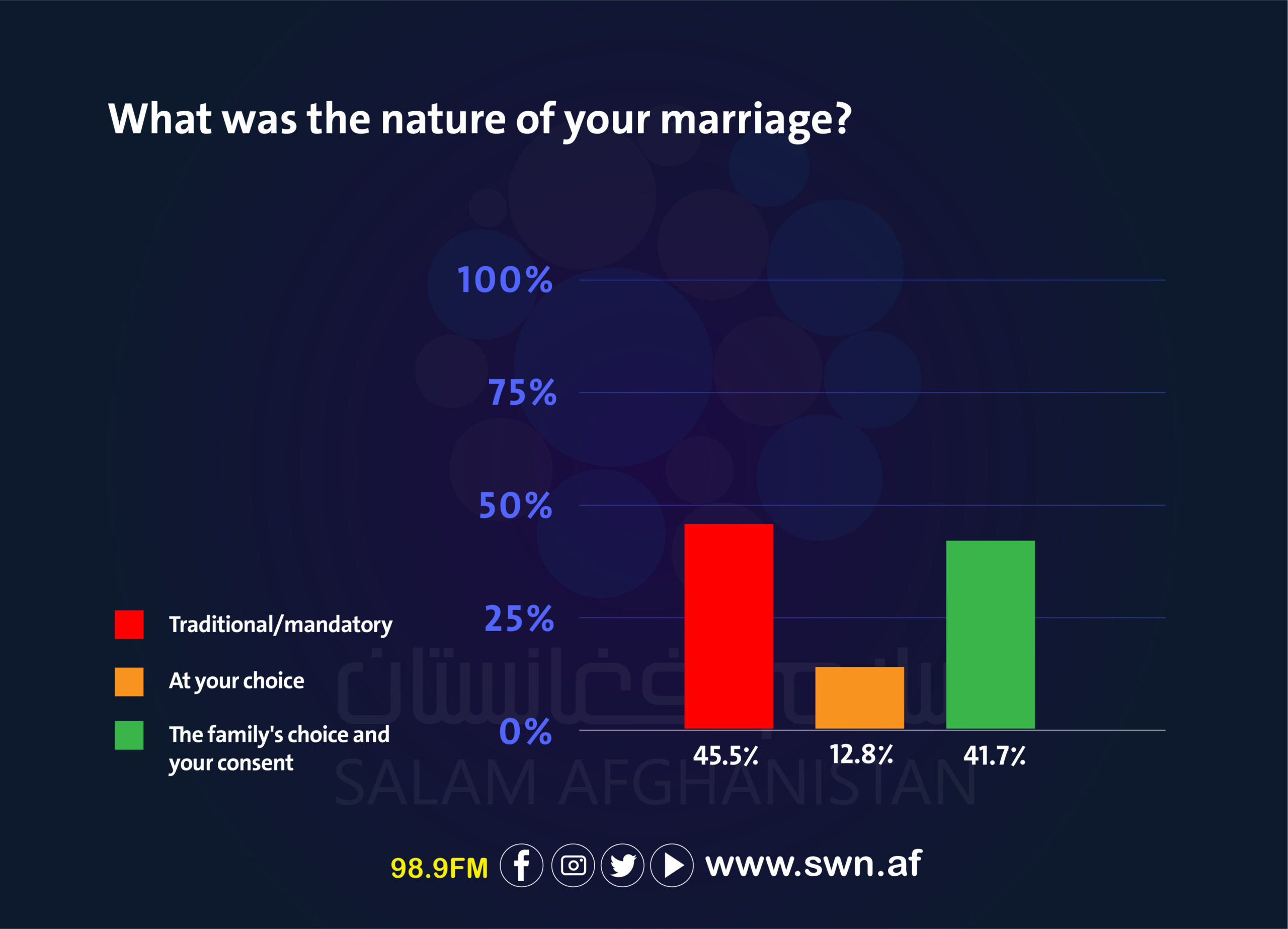
In the survey, 36.9 percent of the women said that they are satisfied with their marriage. However, 63.1 percent said they are not satisfied with their married life at all.
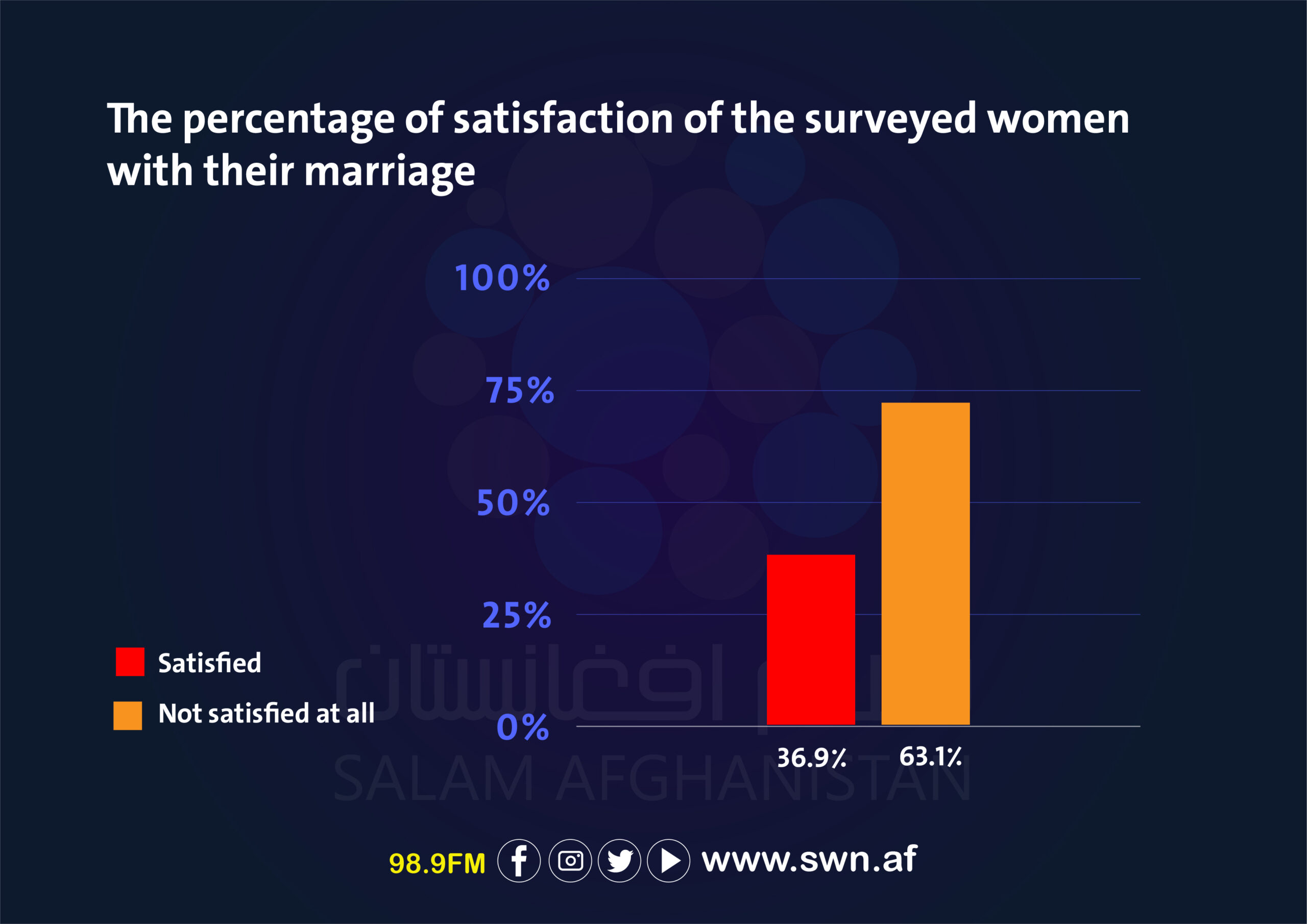
Out of the total number of married women who participated in this survey, 11% got married before the age of 16, 20% got married between the ages of 16 to 20, 30.3% got married between the ages of 20 to 25, and 38.6% got married at the age of 25 or older. Therefore, according to these statistics, 31% of these women got married before the age of 20, and the remaining 69% got married at the age of 20 or older.
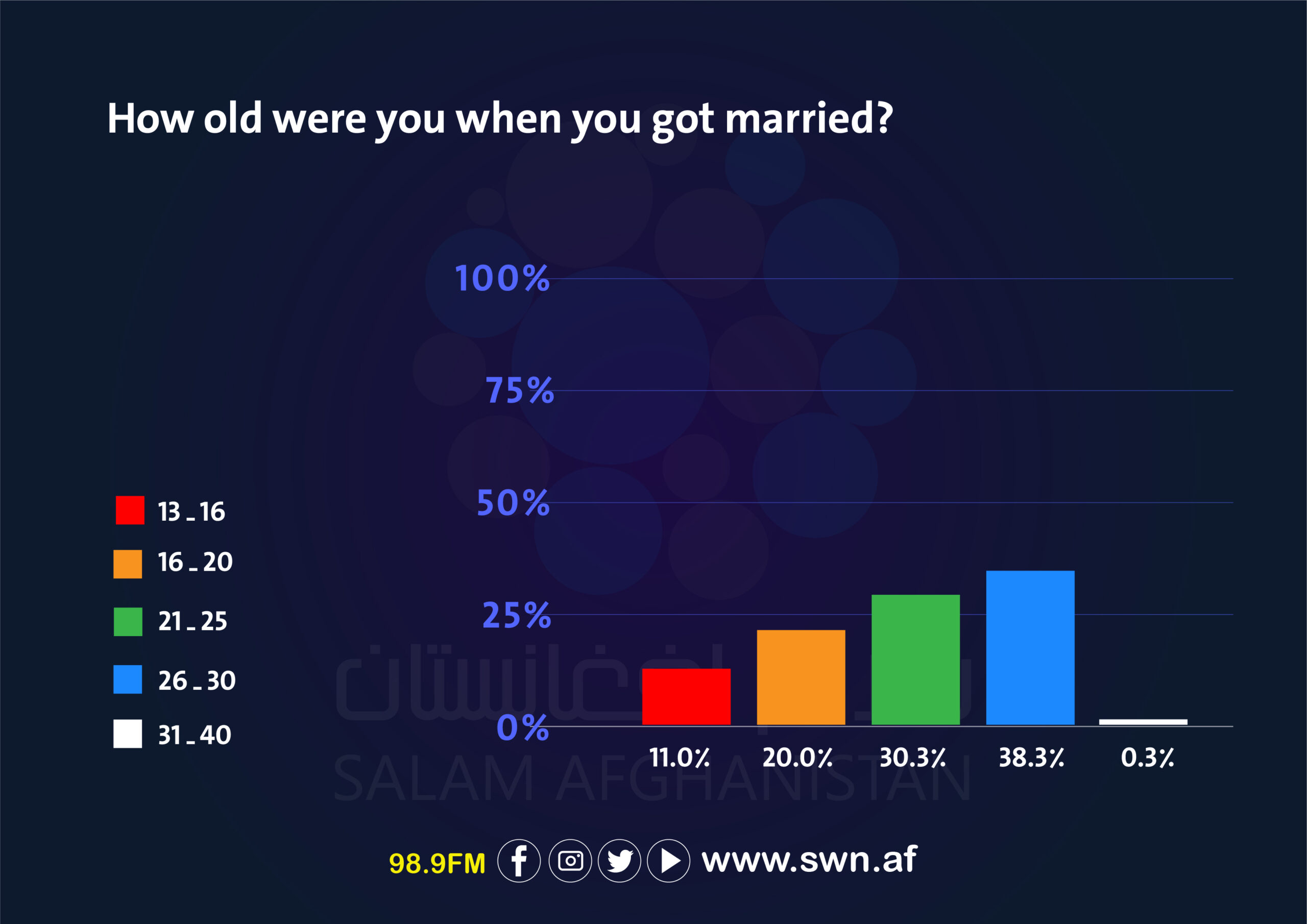
In this survey, 48.5% of the interviewed unmarried participants stated that their families should consult with them on their marriage, 25.3% emphasized the necessity of seeking consultation regarding marriage, 13.1% mentioned that they are not questioned about marriage, and another 13.1% stated that they will marry according to their own desires.
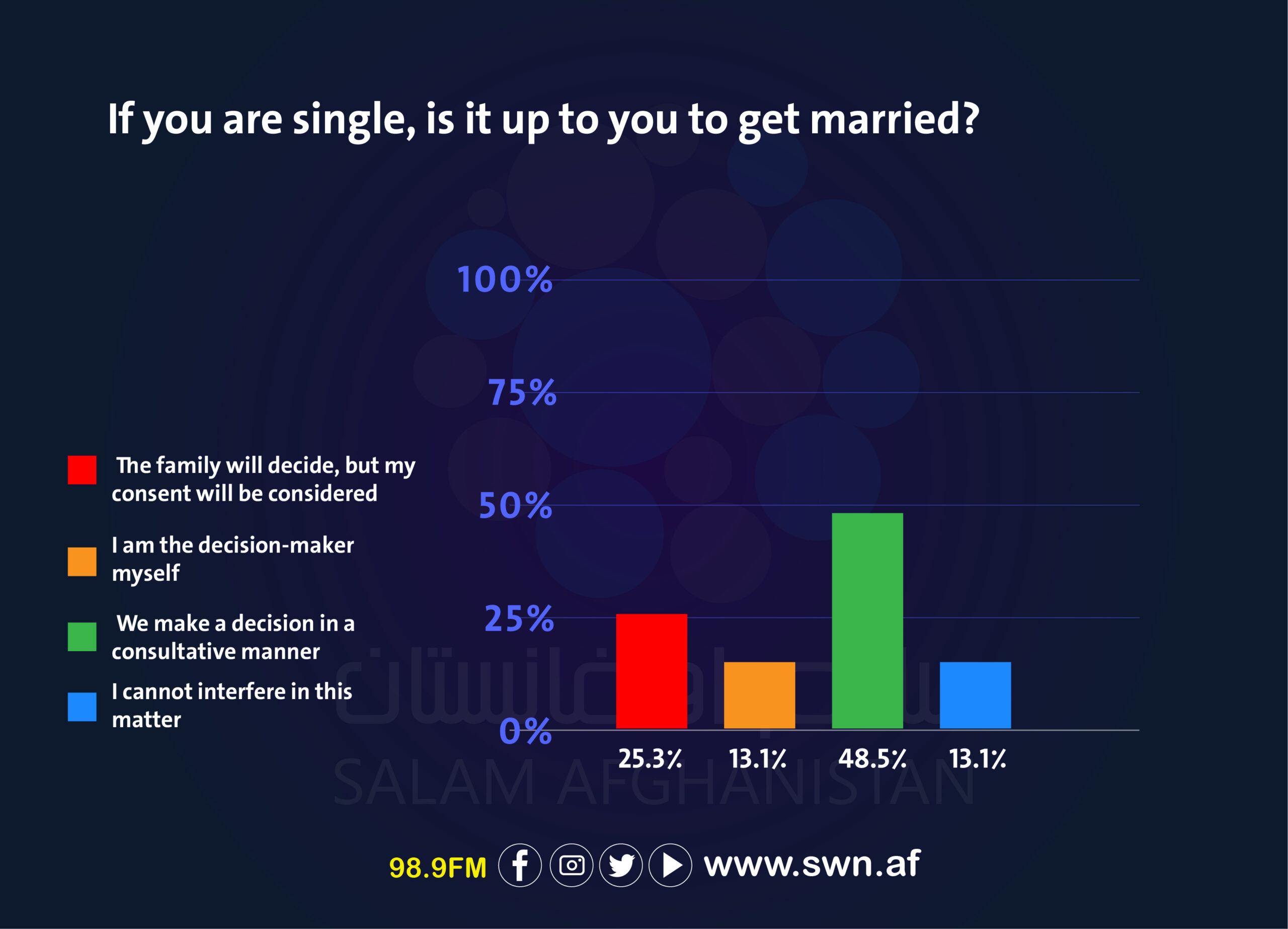
Recommendations
In order to have a successful married life, it is necessary that both sides, “the man and the woman”, should have complete consent and marry according to their own will and the families, elders and government are responsible to educate their relatives, children and people so that oppression can be prevented.
The problem of forced marriages should be considered seriously because marriage is an important part of life and everyone must be aware of this crucial matter.
Therefore, the following recommendations are reminded as examples:
- It is necessary that the rights given to women in the blessed religion of Islam should be ensured, and laws should be established in the matters related to marriage.
- Along with the Islamic principles, more civil laws for the rights of girls and women should be enacted to prevent forced marriages.
- Women should have access to their all due rights as per the laws.
- Serious measures need to be ensured to prevent the exchange of women or underaged girls in settling feuds.
- People need to be educated on girls’ rights in regard to marriage.






